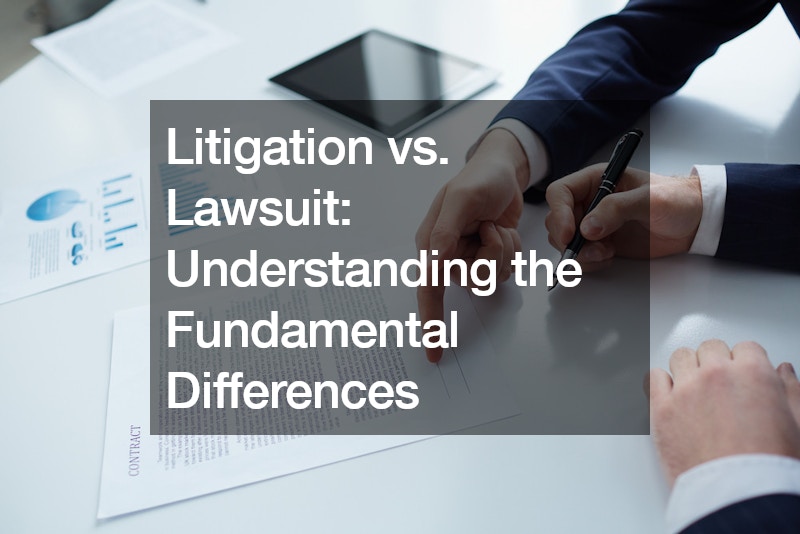
This article will delve into the fundamental differences between litigation and lawsuits to provide clarity on these legal terms. Read on to learn more about these important aspects of law!
1. What Is Litigation?
Litigation refers to the process of taking legal action through the court system to resolve a dispute. It involves various steps such as filing a complaint, discovery, motions, and trial. The outcome of litigation is typically a judgment or settlement that resolves the dispute between the parties involved.
Litigation requires the expertise of legal professionals such as attorneys, judges, and legal support staff to navigate the complex legal system. It can be a lengthy and costly process, depending on the complexity of the case and the parties involved. Litigation is often used in cases where negotiation or alternative dispute resolution methods have failed.
Business disputes, contract breaches, and civil rights violations are common reasons for litigation. Parties involved in litigation may choose to hire a divorce attorney, bankruptcy lawyer, or other legal specialists based on the nature of the case.

2. What Is a Lawsuit?
A lawsuit is a legal action initiated by one party against another to seek a legal remedy or compensation for damages. It typically begins with the filing of a complaint or petition in a court of law. The resolution of a lawsuit can result in a judgment, settlement, or dismissal of the case based on the evidence presented.
Initiating a lawsuit involves serving legal documents to the defendant, who then has the opportunity to respond to the allegations. The resolution of a lawsuit can occur through negotiation, mediation, arbitration, or trial, depending on the preferences of the parties involved. Legal representation, such as a Spanish personal injury lawyer or high asset divorce attorney, can be crucial in achieving a favorable outcome.
Personal injury cases, contract disputes, and property maintenance issues are common reasons for individuals to file lawsuits. Parties involved in a lawsuit may incur various costs such as attorney fees, court expenses, and potential damages awarded or paid.
3. How Are Litigation and a Lawsuit Similar?
Litigation and a lawsuit both involve legal proceedings through the court system to resolve disputes or seek legal remedies. They may employ similar resolution methods such as negotiation, mediation, or trial to reach a resolution. Court involvement is a common factor in both litigation and a lawsuit, with judges presiding over the cases and making legal decisions based on the evidence presented.
Legal representation is often required in both litigation and a lawsuit to advocate for the parties’ interests and navigate the legal complexities of the case. Parties may choose to hire a divorce attorney, bankruptcy lawyer, or other legal professionals based on their specific needs. The involvement of the court system provides a structured framework for resolving legal disputes through established legal procedures.
In cases where parties cannot reach a settlement through negotiation or alternative dispute resolution methods, litigation or lawsuit may be the next course of action to seek legal remedies or resolution. Whether it’s a business dispute, personal injury case, or property maintenance issue, legal action may be necessary to protect one’s rights and interests.
4. How Are Litigation and Lawsuit Different?
While litigation and lawsuit share similarities in legal proceedings, they differ in scope of action and the types of cases involved. Litigation encompasses a broader range of legal actions, including lawsuits, administrative proceedings, and other legal disputes. Lawsuit specifically refers to a legal action initiated in a court of law to seek a legal remedy or compensation.
Litigation may involve complex cases such as class action lawsuits, business disputes, or multifaceted legal issues that require specialized legal expertise. Lawsuits, on the other hand, often pertains to individual disputes, small claims court cases, or personal injury claims that can be resolved through legal action. Legal representation may vary in litigation and lawsuit cases, with parties choosing attorneys based on the nature of the case.
In certain situations, litigation may be preferred over a lawsuit for its comprehensive legal process and ability to address complex legal issues. Lawsuits, on the other hand, may be favored for individual disputes or cases that do not require extensive legal proceedings. Understanding the differences between litigation and lawsuits can help individuals make informed decisions when facing legal disputes.

5. When Is Litigation Preferred Over a Lawsuit?
Litigation may be preferred over a lawsuit in cases involving complex legal issues that require a comprehensive legal process to resolve. Business disputes, class action lawsuits, and cases with multiple parties or legal issues may benefit from the thoroughness of litigation. Legal representation, such as a divorce attorney, bankruptcy lawyer, or other legal specialists, can provide essential guidance in navigating the complexities of litigation.
A high-asset divorce attorney may be necessary in cases where substantial assets are at stake and require expert legal handling. Litigation provides a structured framework for resolving legal disputes through established legal procedures and court involvement. Parties involved in litigation may incur costs such as legal fees, court expenses, and expert witness fees as part of the litigation process.
Legal representation, negotiation, and court involvement are essential components of litigation that can lead to a favorable outcome for parties involved in complex legal disputes. Choosing litigation over a lawsuit may be the preferred course of action in cases that require specialized legal expertise and thorough legal proceedings.
6. When Is a Lawsuit Preferred Over Litigation?
A lawsuit may be preferred over litigation in cases involving individual disputes, small claims court cases, or personal injury claims that do not require extensive legal proceedings. Individual disputes or legal issues that can be resolved through legal action may benefit from a lawsuit. Parties involved in a lawsuit may seek legal representation from a Spanish personal injury lawyer, bankruptcy lawyer, or other legal professionals based on the nature of the case.
Small claims court cases, property maintenance disputes, and personal injury claims are common reasons for individuals to pursue a lawsuit for legal remedies or compensation. Legal fees, court expenses, and potential damages awarded are considerations for parties involved in a lawsuit. The resolution of a lawsuit may involve negotiation, mediation, arbitration, or trial, depending on the preferences of the parties.
Individual disputes or legal issues that do not require the extensive legal process of litigation may find resolution through a lawsuit. Parties involved in a lawsuit may choose to hire legal representation, such as a Spanish personal injury lawyer or other legal specialists, to advocate for their interests and seek legal remedies or compensation.

7. What Are the Costs Associated With Litigation?
litigation costs may include legal fees for attorneys, court expenses for filing documents and appearing in court, and expert witness fees for specialized testimony. The complexity of the case, the number of parties involved, and the duration of the litigation process can impact the costs incurred by parties. Legal representation, negotiation, and court involvement are essential components of litigation that contribute to the overall costs.
Parties involved in litigation may incur considerable expenses throughout the legal process, from filing fees and attorney fees to potential damages awarded or paid. Court expenses, including transcripts, court appearances, and other legal proceedings, can add to the overall costs of litigation. Expert witness fees may be necessary in cases that require specialized knowledge or testimony to support the legal arguments presented.
Choosing litigation over a lawsuit may result in higher costs due to the thoroughness of the legal process and the expert legal representation required. Parties involved in litigation may need to budget for legal fees, court expenses, and other costs associated with the legal proceedings. Understanding the costs associated with litigation can help parties make informed decisions when facing complex legal disputes.
8. What are the Costs Associated With Lawsuits?
Lawsuit costs may include filing fees for initiating the legal action, attorney fees for legal representation, and potential damages awarded or paid as part of the resolution. The complexity of the case, the duration of the legal proceedings, and the resolution method employed can impact the costs incurred by parties involved in a lawsuit. A party may seek legal representation from a Spanish personal injury lawyer, bankruptcy lawyer, or other legal specialists for their expertise in navigating the legal process.
Attorney fees may vary depending on the nature of the case, the legal services provided, and the resolution method employed in the lawsuit. Court expenses, such as filing fees, transcripts, and other legal proceedings, may add to the overall costs of the lawsuit. Damages awarded or paid as part of the resolution can impact the financial outcome of the lawsuit for the parties involved.
Choosing a lawsuit over litigation may result in lower costs due to the streamlined legal process and the specific legal issues involved in the case. Parties involved in a lawsuit may budget for filing fees, attorney fees, and potential damages as part of the legal proceedings. Understanding the costs associated with lawsuits can help parties assess the financial implications of pursuing legal action.

9. Can Litigation and a Lawsuit Overlap?
Litigation and lawsuits may overlap in cases involving multifaceted legal disputes that require comprehensive legal action to resolve. Multiple parties may be involved in the legal action, each seeking legal remedies or compensation for their claims. The appeals process can also contribute to the overlap between litigation and lawsuit, as parties may challenge legal decisions or seek a review of the judgment.
Appeals can prolong the legal process and add to the costs incurred by parties involved in litigation or lawsuits. Legal representation may play a crucial role in navigating the appeals process and advocating for the parties’ interests. Parties may choose to hire attorneys specializing in appellate law or legal appeals to represent their interests in the appeals process.
In cases where litigation and lawsuit overlap, parties may incur higher costs due to the extensive legal proceedings and the additional steps involved in the appeals process. Expert legal representation, negotiation, and court involvement are essential components of navigating the legal complexities of overlapping litigation and lawsuits. Understanding the overlap between litigation and lawsuits can help parties prepare for the various legal challenges they may face.
10. How Does Jurisdiction Impact Litigation and Lawsuits?
Jurisdiction can impact litigation and lawsuits in various ways, including court selection, forum shopping, and the applicable laws governing the case. Parties may choose specific courts based on their jurisdictional authority, expertise in specific legal matters, or proximity to the parties involved. Forum shopping involves selecting a favorable court or jurisdiction to pursue legal action based on the perceived advantages of that jurisdiction.
Applicable laws may vary depending on the jurisdiction in which the legal action is initiated, affecting the legal arguments, remedies, and outcomes available to the parties involved. Understanding jurisdictional issues can help parties navigate the legal process, select the appropriate court, and advocate for their interests effectively. legal representation may be necessary to address jurisdictional challenges and ensure compliance with the laws governing the case.
Parties may consult with attorneys specializing in jurisdictional matters, such as property maintenance, buy firearms, mortgage loans, or transloading, to assess the impact of jurisdiction on their legal rights and remedies. Expert legal advice can help parties understand jurisdictional issues, navigate the court selection process, and advocate for their interests in the legal proceedings. Jurisdictional considerations can significantly impact the outcome of litigation and lawsuits, making it essential for parties to address jurisdictional challenges effectively.
From needing representation as a legionella outbreak response company to trying to protect your law enforcement career, lawyers are essential to understanding the law and the subsequent actions that need to be taken on a case-by-case basis. By exploring the differences between litigation and lawsuits, individuals can make informed decisions when facing legal disputes. Understanding the scope of action, legal representation, costs, and jurisdictional impact can help parties navigate the complex legal process and seek resolution effectively. Whether it’s a business dispute, personal injury case, or property maintenance issue, having a clear understanding of litigation vs lawsuit can empower individuals to protect their legal rights and interests.



